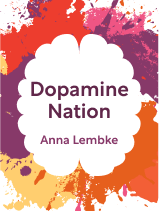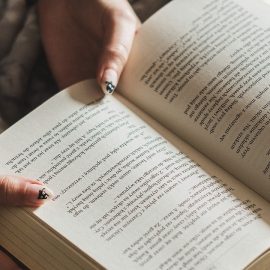

This article is an excerpt from the Shortform book guide to "Dopamine Nation" by Anna Lembke. Shortform has the world's best summaries and analyses of books you should be reading.
Like this article? Sign up for a free trial here.
What are the biggest dangers of isolation? What are the psychological consequences of cutting yourself off from others? How can you stop isolating yourself?
Bestselling author and psychologist Anna Lembke takes a unique perspective on the dangers of isolation by connecting them to society’s fixation on pursuing “high-dopamine” activities. She claims that prioritizing instant gratification feeds into the dangerous cycle of isolation.
Keep reading to learn the two dangers of isolation and Lembke’s advice for overcoming them.
The Dangers of Isolation, According to Lembke
According to Anna Lembke, one of the dangers of isolation is that isolating yourself from others prevents you from overcoming unwanted behaviors. Lembke claims that unwanted behaviors are driven by an endless pursuit of “high-dopamine” activities, which only bring pleasure in the short run. Your brain is fine-tuned to keep consuming pleasurable goods—and modern society provides an abundance of these goods and plenty of time to consume them. Lembke asserts that rising overconsumption is behind a well-documented decrease in happiness among industrialized nations, and she highlights the rise in addiction-related deaths in all age groups between 1990 and 2017.
| When Does Free Time Make People Unhappy? Lembke draws a clear link between excess leisure time and overindulgence. She also suggests this may be a cause for rising unhappiness in industrialized nations. However, psychological research shows that leisure time by itself doesn’t necessarily decrease human flourishing. Understanding how much free time to have and how to use your free time well may prevent you from falling into overindulgence. Studies have revealed a kind of “goldilocks zone” of free time that increases happiness. Fewer than two hours of free time per day makes people less happy—but so does more than five hours. Between two and five hours seems like the optimal range. That said, using excess free time wisely can mitigate its ill effects. Filling your excess free time with meaningful hobbies or socializing can make you much happier than activities that feel hollow, repetitive, or lonely, such as the repetitive consumption of abundantly pleasurable goods like social media or junk food. |
Lembke explains that being trapped in a cycle of overconsumption and overindulgence may lead you to cut off family and friends. The two main reasons Lembke identifies for cutting off others are also the dangers of isolation to your mental health: 1) shame about your behavior and 2) choosing dopamine over your relationships.
First Danger of Isolation: Feeling Shame
When you compulsively overindulge, you may feel ashamed of your behavior, which can lead you to conceal it from others. Feeling ashamed of your behavior leads to the danger of isolation because the more time you spend hiding from other people, the less time you will spend connecting with them. Furthermore, maintaining the façade that you don’t have a struggle with overindulgence may make it harder to be open and fully yourself around others. This will erode your ability to connect, leaving your relationships less rewarding.
Shame also creates an obstacle to overcoming overindulgence because it can prevent you from reaching out for help since doing so would require disclosure. When shame becomes an obstacle to connection, you may find yourself struggling to break out of your behavior patterns alone.
| The Negative Beliefs Underpinning Shame According to Lembke, feeling shame is a danger of isolation as it may further isolate you and make it harder to change your behavior. Others have pointed out that your shame may be the result of negative beliefs about yourself that you must first overcome. In The Power of Vulnerability, Brené Brown writes that people struggle to break down barriers of shame when they believe they are uniquely undeserving of love. She writes this is the result of two underlying false assumptions. 1. The source of shame is unrelatable. If you think no one else has gone through your experiences, then it raises the stakes of sharing them. It’s a very small risk to reveal a weakness or fault that is commonly shared, whereas it’s a large risk to reveal a weakness or fault that makes you stand out from others. 2. The source of shame negates self-worth. If you are convinced your value as a person is conditional on being successful, moral, or respectable, then anything that goes against those qualities can leave you feeling worthless and irredeemable. When it comes to patterns of overindulgence, both of these beliefs are false. Compulsive overindulgence is a widespread problem that many people struggle with, and no one’s value as a human is diminished by it. If you struggle with either of these underlying beliefs, recognizing their falsehood can make it easier to overcome the shame that may isolate you in a pattern of indulgence. |
Second Danger of Isolation: Choosing Dopamine Over Others
The second danger of isolation relates to the lifestyle it requires—engaging in an unwanted pattern of behavior alienates you from others. Lembke writes the more time and energy you invest in pursuing high-dopamine rewards, the less time and energy you have to invest in relationships.
(Shortform note: While Lembke focuses on the ways overindulgence can leave you more isolated from others, there is also strong evidence that emotional isolation may be the root cause of your overindulgence in the first place. People who grew up without secure and nurturing relationships with their parents are far more likely to struggle to build strong relationships later in life. This leaves them far more vulnerable to turning towards overindulgence as a substitute for intimacy.)
Furthermore, Lembke argues that isolation is dangerous because it can deepen the cycle of overindulgence. Neuroscientists have discovered that pain and pleasure are processed in the same parts of the brain. When you’re feeling pain, you won’t feel pleasure and vice versa. Lembke encourages you to imagine this system as a seesaw that tilts in either the direction of pleasure or pain.
When you engage in your high-dopamine activities, you “press down” on the pleasure side of the seesaw. This not only causes pleasure, but it also “lifts up” the pain side, alleviating your pain. Unfortunately, using pleasure to alleviate pain comes with a catch. Lembke explains that the brain has a natural tendency to balance out the seesaw, seeking what neuroscientists call “homeostasis.” If you press constantly on the pleasure side by overindulging in pleasurable things, the brain will naturally heap more “weight” on the pain side of the seesaw to keep your system in balance.
The neurological relationship between pleasure and pain creates a cycle by adding weight to the “pain side” of the seesaw. Isolation feeds into this cycle because loneliness is painful and therefore creates new incentives to indulge. The lonelier you feel, the greater reason you have to indulge and feel better in the short run. This will likely leave you more isolated and feeling worse again, deepening the cycle of indulgence.
(Shortform note: Lembke writes that loneliness is emotionally painful and thus creates a further incentive for overindulgence. However, this might understate the case. Health researchers have found that chronic loneliness not only causes emotional pain but can also result in physical pain and severe damage to your bodily health. Chronic loneliness increases your risk for high blood pressure, heart attack, stroke, and cognitive decline. It also worsens the symptoms and length of illness when you are sick. By increasing your physical pain alongside your emotional pain, loneliness adds even more weight to the “pain side” of the seesaw.)
How to Overcome Isolation With Authentic Sharing
Lembke encourages breaking out of the dangerous cycle of isolation by authentically sharing with others. Recall that you must be honest with yourself to restore your sense of accountability, agency, and self-awareness. You must also be honest with others to form closer connections. By being yourself with others, you create opportunities to bond while overcoming the shame and isolation of overindulgence.
Lembke writes that forming closer relationships through authentic sharing can help you overcome overindulgence and the dangerous cycle of isolation in three distinct ways:
- When you have higher-quality relationships, you will feel less of a need to pursue dopamine-heavy rewards to cope with loneliness.
- Discussing your behavior with others can help you find solutions. Your friends and family may offer input and advice to help you change your patterns of behavior.
- By articulating your patterns of overindulgence to others, you may develop a more honest and realistic assessment of your habits.
| Is Authentic Sharing Enough? Many psychologists agree with Lembke’s assertion that close relationships can play a vital role in alleviating loneliness, gaining advice, and developing a more honest assessment of behavior. But some argue that while authentic sharing may be necessary for rebuilding relationships, it may not be enough to overcome the dangers of isolation. If your patterns of indulgence have seriously damaged your relationships, you may need to utilize other forms of relationship repair, like conflict resolution or relationship counseling, to rebuild. This is especially important to understand, because psychologists have found that relationships can be a major source of stress in life, and therefore an obstacle to overcoming indulgence. The added stress of a relationship characterized by broken trust or frequent arguments can provide strong incentives to fall back into overindulgence. Furthermore, traditional treatment programs often overlook relationship stress because addressing these issues can appear like deferring responsibility and blame. Therefore, it is important to remain aware of the health of your relationships and to seek remedies as needed. |

———End of Preview———
Like what you just read? Read the rest of the world's best book summary and analysis of Anna Lembke's "Dopamine Nation" at Shortform.
Here's what you'll find in our full Dopamine Nation summary:
- What causes addictive behaviors and how to take back control
- How pleasure and pain motivate you to consume
- Strategies for keeping your brain’s natural chemicals in balance






